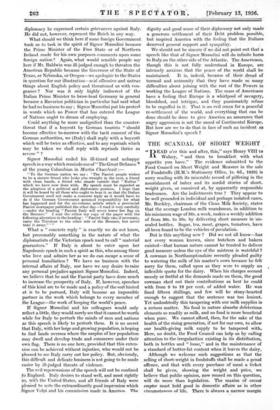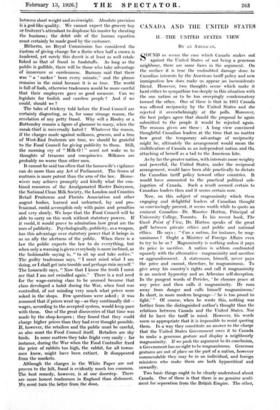-THE SCANDAL OF SHORT WEIGHT
- But is this anything new Did we not-all know—has not every woman known, since butchers and ' bakers existed—that human nature cannot be trusted to deliver good measure unless the eye of the mistress is watchful? A cowman in Northamptonshire recently pleaded guilty to watering the milk of his master's cows because' he felt sorry for them, called upon as they were to supply an inflexible quota fOr the dairy. When his charges seemed moody or fretful at the demands made on them, the good cowman eked out' their Contributions as best' he could with from 9 to 19 per cent, of added water: He *a& fined fifteen shillings, and few Will be stony-hearted enough to suggest that the sentence was too lenient. Yet undoubtedly this tampering with our milk supplies is a serious matter. No food in nature absorbs deleterious elements so readily as milk, and no food is More beneficial when pare. We cannot-afford, then, for the sake of the health of the rising generation, if not for our own, to allow our health-giving milk supply to be 'tampered with. Here, no doubt, the Food Council can help us by calling attention' to the irregularities existing in its distribution; both in bottles and "loose," :and in the maintenance Of a standard of butter-fat content when it leaves the dairy. Although we welcome such suggestions as that the selling of short-weight in foodstuffs shall be made a penal offence, and that with every purchase of 'meat it ticket shall s be given, Showing the weight_ and Price, we believe that public opinion, now roused on this 'question, will do .inore than legislation. The rriaXina of- caveat einptor Must hold good in domestic affairs as in other eircumstances of life. There is always a narrow margin. between short weight and overweight. Absolute precision gocMike-quality.. We cannot expect the grocery boy or fruiterer's attendant to displease his master by cheating the business ; the debit side of the human equation must certainly be made good by the customer.
Hitherto, no Royal Commission has considered the -ti-stOm Of giving change for a florin when half a crown is ,tendered, yet surely this deceit is at least as well estab- fished as that of fraud in foodstuffs. As long as the public is gullible, there will be those who take advantage of innoOenbe or carelessness. Barnum said that there was "a 'sucker' born every minute," and the phrase remains in the mind because it is so true. The world is full of fools, otherwise tradesmen would be more careful that their employees gave us good measure. Can we 4egiSlate for foolish and careless people ? And if we could, should we ?
The tales of trickery told before the Food Council are certainly disgusting, as is, for some strange reason, the revelation of any petty fraud. Why will a Hooley or a Bottomley remain a figure of glamour to many, when the sneak-thief is universally hated ? Whatever the reason, if the charges made against milkmen, grocers, and a firm of West-End fruiterers are true, we should be grateful to the Food Council for giving publicity to them. Still, the morning cry of " Milk-0 ! " must not wake us to thoughts of treasons and conspiracies. Milkmen are probably no worse than other men.
It cannot be said too often that the housewife's vigilance can do more than any Act of Parliament. The frown of matrons is more potent than the arm of the law. House- wives may achieve promptly and kindly what the con- bined resources of the Amalgamated Master Dairymen, the National Clean Milk Society, the London and Counties Retail Fruiterers and Florists Association and other august bodies, learned and unlearned, lay and pro- .
fessional, could accomplish only with pains and penalties and very slowly. We hope that the Food Council will be able to carry on this work without statutory powers. If it could, it would prove to admiration how great are the uses of publicity. Psychologically, publicity, as a weapon, has this advantage over statutory power that it brings in as an ally the alertness of the public. When there is a law the public expects the law to do everything, but when only a warning is given everybody is more inclined, as the fashionable saying is, "to sit up and take notice." The guilty tradesman says, "1 must mind what I am --doing, or I shall get into trouble and perhaps ruin myself." The housewife says, Now that I know the truth I must see that I am not swindled again." . There is a real need for the wage-earning class to be aroused because that class developed a habit during the War, when food was controlled, of not minding very much what prices were asked in the shops. Few questions were asked ; it was assumed that if prices went up—as they continually did— wages, according to the accepted system, would keep pace with them. One of the great discoveries of that time was made by the shop-keepers; they found that they could charge higher prices than they had ever thought possible. If, however, the retailers and the public must be careful, so also must the Food Council .itself. Retailers are shy birds. In some matters they take fright very easily : for instance, during the War when the Food Controller fixed the price . of rabbits too high, the rabbit, for all towns- men knew, might have been extinct. It disappeared from the markets. Although the charges in the White Paper are not proven to the hilt, fraud is evidently much too . common. The best remedy, however, is at our doorstep. There are more, honest tradesmen in England than dishonest. We must turn the latter from the door.



















































 Previous page
Previous page